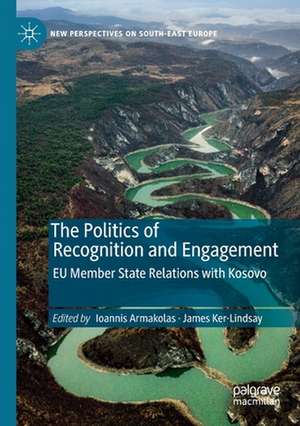The Politics of Recognition and Engagement: EU Member State Relations with Kosovo: New Perspectives on South-East Europe
Editat de Ioannis Armakolas, James Ker-Lindsayen Limba Engleză Paperback – 14 aug 2020
| Toate formatele și edițiile | Preț | Express |
|---|---|---|
| Paperback (1) | 777.50 lei 6-8 săpt. | |
| Springer International Publishing – 14 aug 2020 | 777.50 lei 6-8 săpt. | |
| Hardback (1) | 782.72 lei 6-8 săpt. | |
| Springer International Publishing – 17 iul 2019 | 782.72 lei 6-8 săpt. |
Din seria New Perspectives on South-East Europe
- 9%
 Preț: 628.08 lei
Preț: 628.08 lei - 15%
 Preț: 643.34 lei
Preț: 643.34 lei - 15%
 Preț: 646.11 lei
Preț: 646.11 lei - 15%
 Preț: 641.85 lei
Preț: 641.85 lei -
 Preț: 390.63 lei
Preț: 390.63 lei -
 Preț: 390.25 lei
Preț: 390.25 lei -
 Preț: 393.52 lei
Preț: 393.52 lei - 15%
 Preț: 642.51 lei
Preț: 642.51 lei - 15%
 Preț: 642.51 lei
Preț: 642.51 lei - 18%
 Preț: 895.56 lei
Preț: 895.56 lei - 18%
 Preț: 950.52 lei
Preț: 950.52 lei - 18%
 Preț: 729.53 lei
Preț: 729.53 lei -
 Preț: 485.24 lei
Preț: 485.24 lei - 18%
 Preț: 789.52 lei
Preț: 789.52 lei - 18%
 Preț: 791.57 lei
Preț: 791.57 lei -
 Preț: 386.81 lei
Preț: 386.81 lei -
 Preț: 393.52 lei
Preț: 393.52 lei -
 Preț: 388.90 lei
Preț: 388.90 lei -
 Preț: 387.20 lei
Preț: 387.20 lei
Preț: 777.50 lei
Preț vechi: 948.18 lei
-18% Nou
Puncte Express: 1166
Preț estimativ în valută:
148.79€ • 154.77$ • 122.84£
148.79€ • 154.77$ • 122.84£
Carte tipărită la comandă
Livrare economică 15-29 aprilie
Preluare comenzi: 021 569.72.76
Specificații
ISBN-13: 9783030179472
ISBN-10: 3030179478
Pagini: 245
Ilustrații: XII, 245 p.
Dimensiuni: 148 x 210 mm
Greutate: 0.31 kg
Ediția:1st ed. 2020
Editura: Springer International Publishing
Colecția Palgrave Macmillan
Seria New Perspectives on South-East Europe
Locul publicării:Cham, Switzerland
ISBN-10: 3030179478
Pagini: 245
Ilustrații: XII, 245 p.
Dimensiuni: 148 x 210 mm
Greutate: 0.31 kg
Ediția:1st ed. 2020
Editura: Springer International Publishing
Colecția Palgrave Macmillan
Seria New Perspectives on South-East Europe
Locul publicării:Cham, Switzerland
Cuprins
1. Kosovo, EU Members and the Engagement-Recognition Nexus (James Ker-Lindsay and Ioannis Armakolas).- 2. Kosovo’s Strategy of Recognition and Engagement (Agon Demjaha).- 3. The United Kingdom: Kosovo’s Strongest Supporter in Europe (James Ker-Lindsay).- 4. Germany: From Cautious Recogniser to Kosovo’s EU Ally (Julia Himmrich).- 5. The Czech Republic: Kosovo’s Reluctant and Disengaged Recogniser (Tomáš Dopita).- 6. Poland: Recognition, but No Diplomatic Relations with Kosovo (Jarosław Wiśniewski).- 7. Greece: Kosovo’s Most Engaged Non-Recogniser (Ioannis Armakolas).- 8. Slovakia: Diplomatically Engaged with Kosovo, But No Recognition (Milan Nič).- 9. Romania: Kosovo’s Cautious Non-Recogniser (Paul Ivan).- 10. Cyprus: Firmly Committed to the Non-Recognition of Kosovo (Isabelle Ioannides).- 11 Spain: Kosovo’s Strongest Opponent in Europe (Ruth Ferrero-Turrión).
Recenzii
“This study is … a valuable handbook which explains in detail the individual paths of nine EU-member states in deciding whether or not to recognize Kosovo as well as in their relative engagement or non-engagement with independent Kosovo.” (Jolyon Naegele, Mezinárodní vztahy / Czech Journal of International Relations, Vol. 54 (4), 2019)
Notă biografică
Ioannis Armakolas is Assistant Professor at the Department of Balkan, Slavic and Oriental Studies, University of Macedonia, and Senior Research Fellow and Head of the South-East Europe Programme at the Hellenic Foundation for European and Foreign Policy (ELIAMEP), Greece.
James Ker-Lindsay is Visiting Professor at LSEE-Research on South East Europe at the European Institute, London School of Economics and Political Science, and Research Associate at the Centre for International Studies at Oxford University, UK.
James Ker-Lindsay is Visiting Professor at LSEE-Research on South East Europe at the European Institute, London School of Economics and Political Science, and Research Associate at the Centre for International Studies at Oxford University, UK.
Textul de pe ultima copertă
This edited volume explores the different ways in which members of the European Union have interacted with Kosovo since it declared independence in 2008. While there is a tendency to think of EU states in terms of two distinct groups – those that have recognised Kosovo and those that have not – the picture is more complex. Taking into account also the quality and scope of their engagement with Kosovo, there are four broad categories of member states that can be distinguished: the strong and weak recognisers and the soft and hard non-recognisers. In addition to casting valuable light on the relations between various EU members and Kosovo, this book also makes an important contribution to the way in which the concepts of recognition and engagement, and their relationship to each other, are understood in academic circles and by policy makers.Ioannis Armakolas is Assistant Professor at the Department of Balkan, Slavic and Oriental Studies, University of Macedonia, and Senior Research Fellow and Head of the South-East Europe Programme at the Hellenic Foundation for European and Foreign Policy (ELIAMEP), Greece.
James Ker-Lindsay is Visiting Professor at LSEE-Research on South East Europe at the European Institute, London School of Economics and Political Science, and Research Associate at the Centre for International Studies at Oxford University, UK.
James Ker-Lindsay is Visiting Professor at LSEE-Research on South East Europe at the European Institute, London School of Economics and Political Science, and Research Associate at the Centre for International Studies at Oxford University, UK.
Caracteristici
Examines the levels of engagement between nine EU countries and Kosovo Explores the concept of 'engagement without recognition’, gaining increasing interest in policy and academic circles Draws on interviews with leading decision makers, newspaper and media sources, official papers
